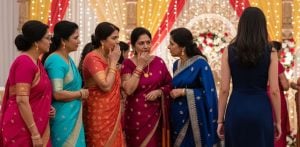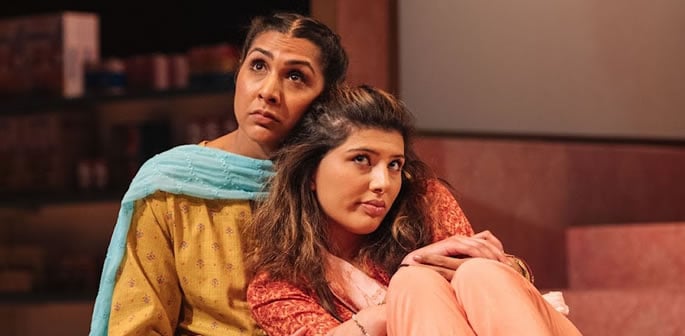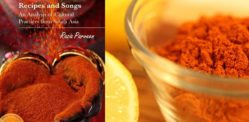"This isn’t just about where we come from. It’s about how we carry it with us. Or not."
The British South Asian themed play Marriage Material performed to literally a full house on Thursday, June 27, 2025, at The Rep in Birmingham, brought a wonderful mix of nostalgia, cultural challenges, racial divides and family politics to the stage.
Based on Sathnam Sanghera’s acclaimed novel and adapted by playwright Gurpreet Kaur Bhatti, the play entertained the audience with a spectrum of historical and cultural references through the lens of a family with strong roots from Punjab, living in Wolverhampton.
Staged from 25 June to 5 July 2025, directed by Iqbal Khan and co-produced by The Rep and Lyric Hammersmith, where the play had its debut, it arrived in Birmingham not only with high expectations but with deep relevance.
The story spans generations within a Punjabi family with British-born daughters navigating duty, identity, love and tradition.
What makes this show stand apart is how it folds social history into intimate storytelling.
The first act is set during a period when immigrants from Punjab, especially men, were determined to do well in a country very different from their homeland, when racial divides in England were more pronounced with the emergence of ‘them and us’ in the home.
The Rep’s version, slightly restructured from its London run, is an engaging and accessible work of theatre.
At its heart, ‘Marriage Material’ is about choice. Who do we marry, and why? What sacrifices uphold family honour, and what costs break it?
These questions ripple across eras and lives in the Bains family. Seamlessly, the play weaves 1970s Wolverhampton with present-day dilemmas, creating parallels that feel as much about heritage as they are about the future.
That universality, coupled with an unflinching regional specificity, makes this drama resonate far beyond its South Asian context.
The performance was funny, often raucously so, but laced with aching truths. Its emotional punch sneaks up on you, through lines delivered with real Midlands grit and gentleness. Over its two acts, ‘Marriage Material’ earns both its laughs and admiration in the way the story is told on the stage.
Writing & Themes – A Script with a Heart
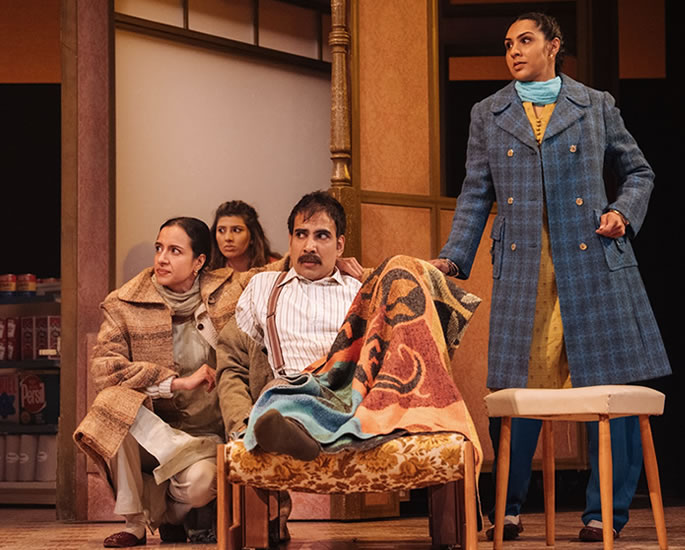
Gurpreet Kaur Bhatti’s adaptation shows a playwright in full command of her material. The script is brisk, bitingly funny and often poetic. It’s layered but never bloated.
Themes of love, rebellion, cultural expectation, and migration thread through each scene. The story spans three generations of the Bains family, yet feels tightly cohesive and absorbing.
Bhatti preserves the novel’s non-linear time structure while refining character arcs for stage clarity. She uses parallel action to highlight how family patterns repeat over time.
Many dialogues echo a real connection to those who are familiar with the lifestyle depicted in the production and increase awareness for those unaware. The culturally referenced comedic lines are a joy.
Arjan, returning from London, echoes the same cultural clash his aunt Surinder faced in the 1970s. Both resist being defined by family honour or tradition.
The idea of being “marriage material” is interrogated, not just romantically but socially. Who is worthy of belonging? The play’s beauty lies in showing how everyone is, and yet, never quite.
Direction & Staging – Iqbal Khan’s Vision Grounded in Truth
Iqbal Khan brings flair and tenderness to the direction. He knows this world, and it shows in the play’s attention to detail, from kitchen table tensions to spiritual rituals.
Khan says: “It’s not a play about Punjabis. It’s a play about Britain. And how we’ve shaped it and been shaped by it.”
Scene transitions are slick and lyrical, helped by Anjali Mehra’s movement direction. Characters transform across decades through body language and minimal costume tweaks.
The staging by Good Teeth is deceptively simple. A corner shop unit becomes a portal through time, with subtle shifts in lighting (by Simeon Miller) to distinguish eras.
Khan said in an interview: “We wanted the audience to feel the pressure of time, that inheritance of family duty sitting right on their shoulders.” This pressure is palpable throughout.
Moments of silence and stillness are used with purpose. One such beat, after a character learns a devastating truth, filled the air with silence, before laughter gently returned.
Cast & Performances – Multiple Roles with Depth and Charisma
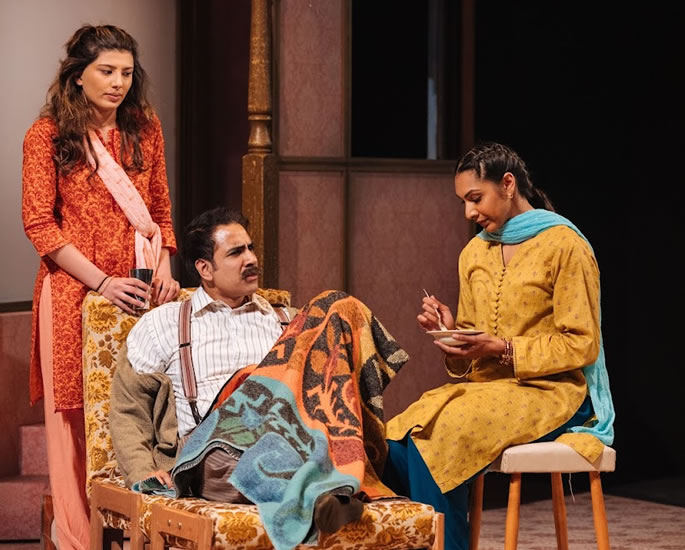
The eight-strong ensemble delivers standout performances, with each actor multi-roling across generations. This format deepened the play’s themes of legacy and repetition. Despite taking a little time to get used to in certain scenes.
Jaz Deol, as both Mr Bains and grandson Arjan, captures contrasting masculinities.
Deol’s Arjan is conflicted and charismatic; his Mr Bains is rigid but not without warmth. Deol is best known for his role as Kheerat Panesar in EastEnders and has previously appeared in Code of a Killer and Together. He brings star quality and sincerity to the stage.
Anoushka Deshmukh shines as Surinder, the younger daughter but the ‘boy’ out of the two girls who rebels and dares to choose her own path. Her energy crackles with youthful defiance and yearning, nicely elevated with a strong Black Country accent. A relative newcomer, Deshmukh has previously worked with Kali Theatre and brings a dynamic freshness to every scene.
Avita Jay as Mrs Bains commands every scene. She balances matriarchal duty with quiet heartbreak. Her monologue about widowhood and sacrifice drew murmurs of admiration from the crowd. Jay’s previous stage work includes the RSC’s Romeo and Juliet, Extinct (Theatre Royal Stratford East), and A Thousand Splendid Suns.
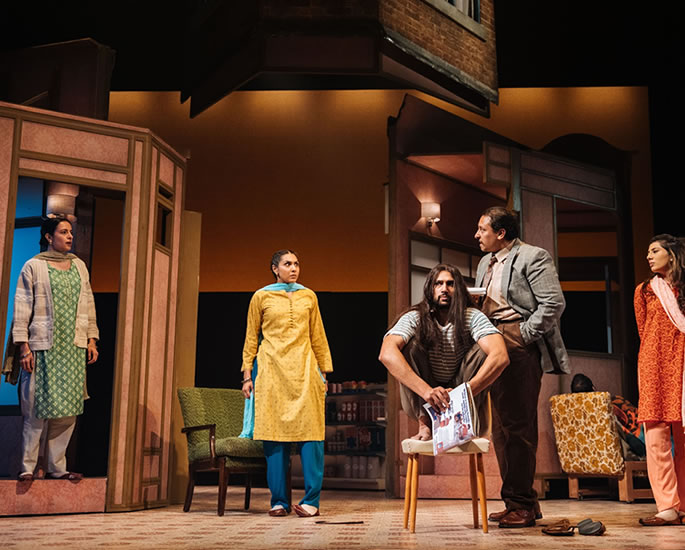
Kiran Landa’s Kamaljit feels lived-in, a woman resigned, but not bitter. The elder sister of Surinder carries the burden of the family without question or a convincing fight, but gets to marry the shop’s long-term live-in helper, Tanvir, played by Omar Malik.
Landa’s characterisation of Kamaljit felt emotionally grounded, and her comedic delivery of funny scenes generated roars of audience laughter. Landa’s previous theatre credits include Lotus Beauty at Hampstead Theatre, I Wanna Be Yours, and Hymn at the Almeida. Her experience shows in her confident, nuanced performance.
Omar Malik, seen in Tartuffe and The Bone Sparrow, lends gravitas to his two lead roles as Tanvir in the first act and later, as Ranjit, the son of Dhanda, played by Irfan Shamji.
Shamji who is known for The Two Popes and The Father and the Assassin, brings personality dictated by ambition, inequalities and even hints of greed to the stage as young and subsequently very old Dhanda.
Celeste Dodwell adds humour and bite in supporting roles, especially as Surinder’s teacher and then Arjan’s ‘Gori’ girlfriend. Known for Doctor Who and RSC’s Julius Caesar, she handles tonal shifts with skill.
Tommy Belshaw impresses with subtle transitions between roles like Bill and Jim, previously featured in Gentleman Jack and Faustus: That Damned Woman.
What was perhaps missing from the play was the role of an ‘aunty’ that added to the overall comedy and cultural representation of the ‘village gossip’ and the known nosey-parker. Especially in the first act.
Design, Music & Cultural Resonance
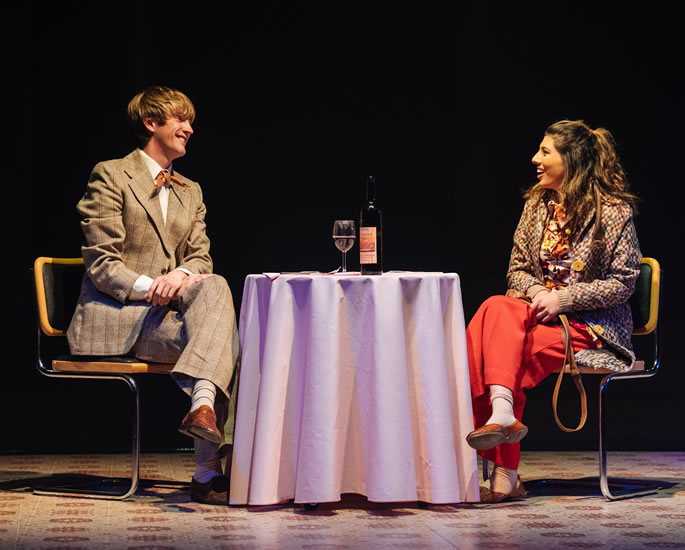
Set design by Good Teeth captures a tactile sense of domesticity and community. The corner shop shelves are lined with familiarity – old cereal boxes, nostalgic flyers and memories.
For those perhaps not familiar with smaller theatre sets, seeing actors change the furniture and props in between scenes added another dimension to the format of the play.
Lighting changes and simple scene-shifting signal decades without overloading the senses. The aesthetic blends realism and expressionism, especially in dream-like transitions.
Holly Khan’s music and sound design are subtle but evocative. Snatches of Punjabi rhythms and Indian instrumentation mixed with other synthetic sounds evoke and mark the passage of time without becoming pastiche.
Cultural references from Enoch Powell to spiritual healing are integrated with care. They’re not explanatory but highlight the lived experience of life as it was during that time, racism, fear and struggles faced by those who ‘did not belong’ in a country they were putting their heart and souls into.
The setting in Wolverhampton felt it was completely central to the story and play. The accents, humour and socio-political textures affirm how rooted this story is in place.
Impact, Relevance and Legacy
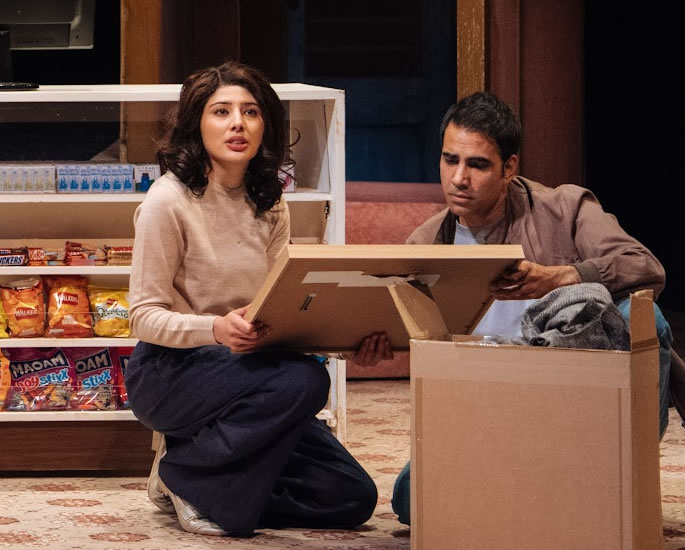
‘Marriage Material’ lands at a moment when questions of identity, belonging and history feel more urgent than ever. It doesn’t offer solutions, but it asks us to watch, listen and adapt.
You don’t have to be Punjabi, Sikh or even British Asian to see yourself in this story. That’s its triumph. It invites empathy across lines of class, faith and generation.
By the curtain call, the audience was on its feet. Not just out of politeness, but recognition of a production that presented a life of many in the audience had experienced and still were.
Gurpreet Kaur Bhatti says: “This isn’t just about where we come from. It’s about how we carry it with us. Or not.” That idea lingers long after you leave.
‘Marriage Material’ is a vital and compassionate piece of British theatre. It needs to be seen as a performative tool that can break down cultural barriers, acceptance and ignorance.
In all, ‘Marriage Material’ delivers a layered, entertaining, and deeply human theatre experience. From the sharp writing to the moving performances, every element of this production is finely tuned and emotionally generous.
Iqbal Khan’s direction, combined with Bhatti’s textured script, ensures that the play speaks to both the heart and the head. It respects its audience while challenging them to reflect.
This is a story rooted in Wolverhampton but one that stretches far beyond its postcodes, to anyone who has ever navigated family, love, tradition or the fear of not belonging.
The Rep in Birmingham has proven once again that it is a home for bold, relevant, high-quality storytelling. ‘Marriage Material’ is not only worthy of its stage, it elevates it.
This is theatre with resonance, humour and heart. A rare combination that leaves you moved, reflective, and very entertained.










































